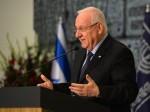President Reuven Rivlin Rivlin addresses the Nov. 30 ceremony at his residence marking the first Day of the Expulsion and Deportation of Jews from Arab Lands and Iran. (photo by GPO/Mark Neiman)
It may have been 47 years ago but Yossef Carasso remembers every detail of the night that he was taken to an Egyptian police station from his home in the city of Tanta, near Cairo. It was the first night of the 1967 war.
“We were the only Jewish family still left in Tanta and, at 10 p.m., there was a knock on the door,” said Carasso. “The policeman told my father, ‘We’re looking for your son and son-in-law.’ They took us to a police station and left us there all night.”
Carasso, who was not accused of any crime, was among 400 Jews who were imprisoned in Egypt at the start of the war when Egypt, along with Syria and Jordan, attacked Israel. For six months, he said, his parents didn’t know if he was still alive. Finally, he was allowed to write to them. Two years later, he was released and, the next day, he and his family left Egypt, originally for France and then for Israel. According to Justice for Jews from Arab Countries (JJAC), almost 120,000 Jews left Egypt in the 1950s and ’60s. There are only a few dozen Jews left in Egypt today.
Last week, Carasso attended a ceremony at Israeli President Reuven Rivlin’s residence, designating Nov. 30 as the national day of commemoration of the plight of Jewish refugees from Arab lands and Iran. According to the United Nations, about 850,000 Jews left their homes in Arab countries; and 750,000 Palestinians became refugees with the creation of the state of Israel in 1948. The largest number of Arab Jews came from Morocco, Algeria and Iraq. Today, half of all Israelis have roots in Arab countries.
Read more at themedialine.org.
***
On Dec. 3, World Jewish Congress co-hosted in New York with other Jewish organizations The Untold Story of 850,000 Refugees. More than 400 people attended the event that came on the heels of the first official commemoration in Israel of the suffering of Jews who were expelled or forced to leave Arab and other Muslim countries in the wake of the establishment of the Jewish state in 1948.
Israel’s United Nations Ambassador Ron Prosor opened the evening, calling on UN Secretary-General Ban Ki-moon to work for the establishment of a documentation and research centre dedicated to Jewish refugees from Arab countries. WJC President Ronald Lauder spoke, as did Malcolm Hoenlein of Conference of Presidents of Major American Jewish Organizations.
Dudu Tassa and the Al-Kuwaitis performed; Rabbi Elie Abadie of Justice for Jews from Arab Countries and Nelly Shiloh of the Permanent Mission of Israel to the UN presented a selection from Iraqi-born Israeli writer Eli Amir’s novel The Dove Flyer; a portion of the movie Farewell Baghdad was screened; and remarks were also heard from Cynthia Shamash, whose memoir recalling her family’s escape from Baghdad when she was a child will be published next year.
– From worldjewishcongress.org

